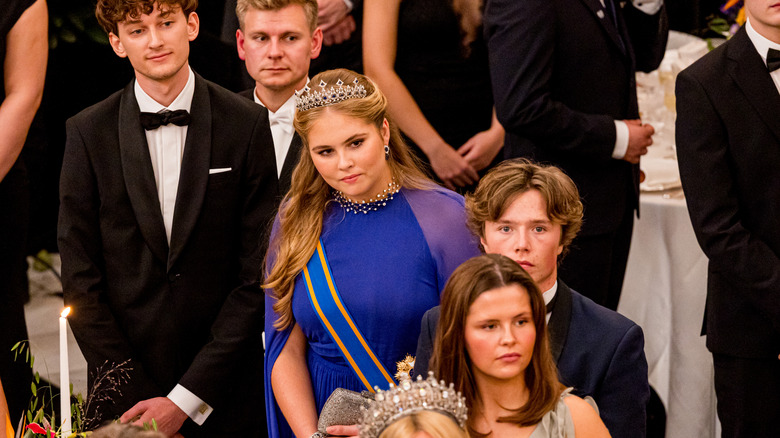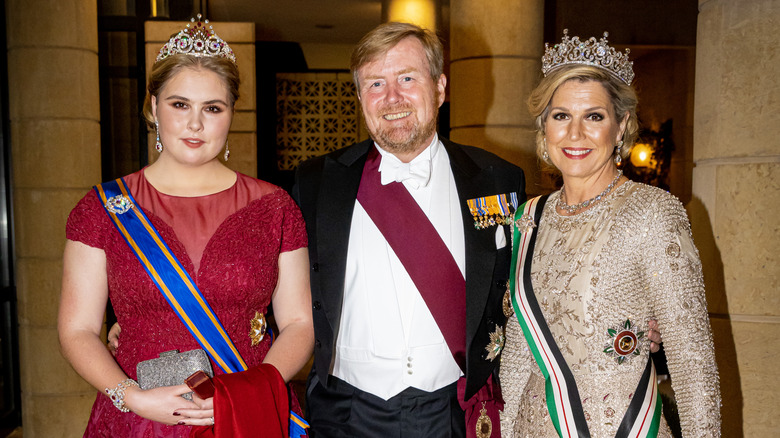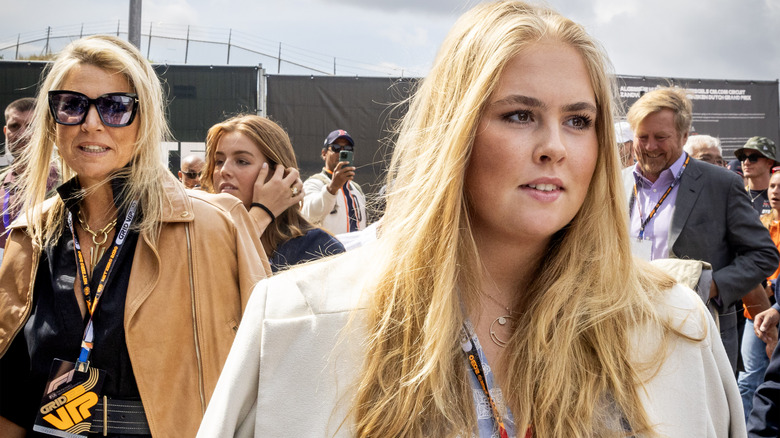Everything You Need To Know About Princess Amalia, The Heir To The Dutch Throne
These days, it oftentimes seems that the royal scandals of the past continue to haunt the present. Belgium is still grappling with the reality that its former monarch, King Albert II, hid a royal love child for decades. Monaco continues to worry that Princess Charlene may be unhappy — since the principality's previous first lady, Princess Grace Kelly, was said to be miserable in her royal role. Even the United Kingdom has been known to struggle with the infidelity crisis that brought King Charles III and Camilla, Queen Consort, together all those years ago.
The good news, though, is that there is an up-and-coming generation of young royal heirs who seem prepared to bring a new life to Europe's most fascinating monarchies. In Norway, Princess Ingrid Alexandra has opted to stay away from all the drama of social media, choosing instead to focus on issues like racism. Prince Christian of Denmark wanted his 18th birthday party to include impressive youths of all walks of life, so as to avoid throwing a society event. And, the Netherlands' Catharina-Amalia, Princess of Orange, has been just as keen to shake things up.
Ever since she was born on December 7, 2003, Catharina-Amalia has been destined to be the next queen of the Netherlands. From what we can tell, the princess is already planning to modernize the monarchy. Thanks to her views on LBGTQ+ rights, mental health, and royal allowances, Catharina-Amalia seems ready to bring the crown into the 21st century.
Princess Catharina-Amalia has Latin American roots
Unlike most other European royals, Catharina-Amalia, Princess of Orange's roots are not entirely in Europe. As the daughter of the Dutch King Willem-Alexander and his Buenos-Aires-born bride, Queen Máxima, Catharina-Amalia has strong ties to the Netherlands and Argentina, alike. This has been evident since Catharina-Amalia was just a child. When the princess was growing up, Máxima would speak to her in Spanish, and do her best to introduce her to elements of Argentine culture, such as food and holiday celebrations.
A decade or so later, it seems that the queen's parenting efforts have paid off. As reported by the Mendoza Post, Catharina-Amalia speaks Spanish well enough to communicate with her maternal grandparents when she visits them in Patagonia. She enjoys downhill skiing in the Andes, as well as the royal family's more traditional spots in the Austrian Alps. And, she is familiar with the family recipe for alfajores — Argentine wafer cookies stuck together with dulce de leche and rolled in coconut flakes.
Of course, as the heir to the Dutch throne, Catharina-Amalia can't lean too heavily into Argentine culture — at least not in public. After all, she has an obligation to promote local culture above all else. That being said, her younger sister, Princess Alexia, has been applauded by the Argentine newspaper, La Nacion, for her "passion for asado [Argentine barbecue], Patagonia, and horseback riding." One can only imagine that Catharina-Amalia grew up with these things, too.
She could be the first European queen to marry a woman
In the past, members of the Dutch royal family have been confined to heterosexual relationships, but this has already started to change. As reported by the BBC, Prime Minister Mark Rutte made this point clear in 2021 when he wrote, "The cabinet does not see that an heir to the throne or the king should abdicate if he or she would like to marry a partner of the same sex." At the time of the statement, Rutte expressed that the government's policy — which forbids ruling monarchs from entering same-sex marriages — failed to comply with the "norms and values of 2021." All in all, this means that the current heir, Catharina-Amalia, Princess of Orange, could become the first queen to tie the knot with another woman.
Although it is unclear just how much of a role Catharina-Amalia had in influencing the prime minister's decision, it is known that the princess cares deeply about LBGTQ+ rights. When she was just 14, the heir made her stance clear by wearing purple to school for "Purple Friday" — a day dedicated to the spirit of the LBGTQ+ community. Later, in her biography, "Amalia," which was written in collaboration with Claudia de Breij, Amalia emphasized her support once more, "My parents have quite a lot of different friends, so I grew up not only with 'uncle and aunt' but 'uncle and uncle' and 'auntie and auntie'" (via the BBC).
Catharina-Amalia has spoken openly about mental health
Over the years, Catharina-Amalia, Princess of Orange, has been quite outspoken about the issues that matter the most to her. Beyond her dedication to LBGTQ+ rights, the heir to the throne has demonstrated an interest in issues surrounding mental health. In the book, "Amalia," which Catharina-Amalia created in collaboration with writer and comedian, Claudia de Breij, the princess opened up about her own mental health struggles. At one point, she even talks about going to therapy. "Sometimes it becomes all too much for me, school, friends, and then I talk to someone," she shared (via Express).
In many ways, Catharina-Amalia's words echoed the calls of other young royals — like Prince Harry and Meghan Markle — for more openness surrounding this issue. Like Harry and Meghan, Catharina-Amalia believes that society needs to normalize conversations around mental health, rather than treating it as a forbidden subject. "I don't think it is a taboo. And it's not a problem to say that in public," the heir told de Breij (via Fox News). She compared psychological wellness to physical fitness, stating, "Everyone talks about healthy food and sports. And that's also important. But mental health is equally important" (via Express).
Although Catharina-Amalia has yet to become a working royal, it is believed that she will become a champion for psychological wellness when she eventually takes the crown.
The princess is not ready to become queen
In some ways, Catharina-Amalia, Princess of Orange, may seem prepared to take on a larger royal role. After all, with her dedication to both LBGTQ+ rights and mental health, the heir already appears ready to lead a life dedicated to important causes. What's more, Catharina-Amalia is often compared to her father, King Willem-Alexander, in terms of her character. Speaking to La Nacion, royal expert, Paula Galloni, remarked that Catharina-Amalia and Willem-Alexander share "calmer" personalities that focus on "what should be and [how things] should seem" — making them perfect to reign.
In spite of these votes of confidence, however, Catharina-Amalia says that she is not ready to take the throne. Speaking with royal author, Claudia de Breij, in preparation for the book, "Amalia," the princess admitted to these feelings of ill-preparedness. "I said to my father, 'You just keep on eating healthy and exercising a lot,'" she said wryly (via People).
Part of the reason that Catharina-Amalia likely feels this way is that she and her younger sisters have been sheltered from the public eye. Growing up, she was not even expected to attend many royal engagements. For this reason, it has been decided that if Willem-Alexander were to die suddenly, Queen Máxima would fill her late husband's position. This would give Catharina-Amalia the chance to study the role until she was feeling prepared enough to take on the responsibility.
Her parents have tried to protect her from the tabloids
It might seem odd for the heir to a European throne to have such a limited understanding of her own royal duties. However, it is understood that King Willem-Alexander and Queen Máxima wanted Catharina-Amalia, Princess of Orange, to grow up with as much normalcy as possible. According to the Daily Mail, Willem-Alexander made this clear prior to his investiture when he announced, "Amalia's title will be made formal when she's 18 and she enters the State Council. Until then, we will protect her as much as possible ... That means she won't participate in official engagements, or as little as possible. Her environment right now should only include her parents, her sisters, and her friends."
If Willem-Alexander and Máxima tried hard to keep Catharina-Amalia out of the spotlight, they tried even harder to keep her out of the tabloids. This has been true since 2005 when the couple struck a deal with the Dutch press. Per the agreement, the royal family can only be photographed at official events or bi-annual "media moments," during which the public figures pose for the cameras.
Although this agreement is not necessarily valid outside of the Netherlands, Willem-Alexander successfully sued the Associated Press in 2010 for publishing photos of himself skiing in Argentina with Máxima and Catharina-Amalia. At the time, Willem-Alexander accused the press of putting "unacceptable pressure" on his daughters (via MLive).
Catharina-Amalia has struggled with the press
In spite of everything her parents have done to protect her from the European tabloids, Cathalina-Amalia, Princess of Orange, has been known to struggle with the way she has been portrayed in the media. As she told Claudia de Breij for the book "Amalia," she has even sought therapy to deal with the press coverage of her life.
As of publication, the princess has chosen not to react to any specific article. However, tabloids have already come under fire for their coverage of her weight. When Catharina-Amalia was just 16 years old, she made the cover of the Spanish publication Caras due to her body type. The magazine's cover story read, "Máxima's oldest daughter proudly wearing her plus-size look." The caption went on to add that Amalia was a victim of bullying, confronting "criticism with force and with the support of her parent. ... A princess who goes through puberty without taboos and defends her figure of 'real woman.'"
Shortly after this iteration of Caras was released, the Internet blew up in response. While some royal fans body-shamed the teenage princess, others defended her gorgeous look. Above all, though, Caras took a hit for reporting on such intimate details of Catharina-Amalia's life without securing an interview. La Nacion, was particularly critical of the report, citing several expert opinions on the dangers of reporting on a teenager's body.
The heir has faced security threats
Inappropriate tabloid reports have not been the only thing to impact Catharina-Amalia, Princess of Orange. The heir to the Dutch throne has also experienced security threats as a result of her high-ranking position. This was especially true in 2022 when Catharina-Amalia was living in a student apartment in the center of Amsterdam. At the time, the 18-year-old princess had chosen this living situation as a way to pursue a sense of "normalcy" during her college years. Unfortunately, however, any semblance of freedom that Catharina-Amalia experienced was short-lived.
Not long after moving into her student residence, the Dutch king and queen were informed that their eldest daughter's safety was at risk. As reported by The Guardian, the royals' reaction was swift. Catharina-Amalia was removed from her student apartments and relocated to the palace. She was only allowed to leave the palace to attend her classes at the University of Amsterdam.
According to Queen Máxima, this was absolutely devastating for the young princess. Per The Guardian, the protective mother told the ANP, "It has huge consequences for her life. It means she doesn't live in Amsterdam and also that she can't really go outside." On the rare occasions that Catharina-Amalia has been permitted to go outside, she has required the support of a team. As Dutch minister for justice and security, Dilan Yesilgoz-Zegerius, reportedly tweeted, "I guarantee that our security services are working day and night to ensure her security."
Princess Catharina-Amalia sometimes longs for normalcy
Due to these security issues, Catharina-Amalia, Princess of Orange, often longs for a sense of normalcy. Following the appearance of credible threats to her safety, the university student has had to give up her independence. Once allowed to mingle with friends, join study groups, and go to parties, Catharina-Amalia has since been confined to palace walls.
According to the Daily Mail, Queen Máxima told the Dutch outlet, ANP, "She can hardly leave the house ... The consequences are very difficult for her. There is no student life for her like others have." Catharina-Amalia echoed these sentiments during her Caribbean tour, telling NOS, "I'm going to be very honest, I'm still having a very hard time. I miss the normal life, the life of a student. Walking the streets, being able to go to a store" (via X, formerly known as Twitter).
Of course, even when Catharina-Amalia did have this freedom, she was never seen as normal. Although the Dutch media pact prevents the princess from being stalked by paparazzi, it does not impede passersby from staring — or even snapping a quick picture. This has made Catharina-Amalia feel deeply uncomfortable over the years. As she told Claudia de Breij for the biography, "Amalia," "Everyone looks at you like you have a goldfish on your head" (via the Daily Mail).
She is not too attached to the monarchy
Although the world is full of royal fans, the monarchy itself is not necessarily the most stable of institutions. As noted by journalist, Peter Conradi, in his book, "The Great Survivors," most European royal families share the "challenge" of guaranteeing "the continued relevance of the institutions they head in the 21st century." Considering the cost of maintaining a monarchy — and the fact that kings and queens no longer rule — this has been no easy task. The Dutch royal family is no stranger to anti-monarchical sentiments. In 2021, King Willem-Alexander was even sued based on the alleged illegality of some of his powers.
With all this in mind, Catharina-Amalia, Princess of Orange, is not too attached to the idea of the monarchy. Speaking to Claudia de Breij for the book, "Amalia," the princess recognized that the institution could one day fall. If the Republicans do eventually triumph, Catharina-Amalia seemed to think that she would be okay. "They can do that of course, and then I'll go on living too," she said (via the Daily Mail).
It is not immediately clear what Catharina-Amalia would do in such circumstances, but, either way, the princess' future seems bright. She is currently pursuing an undergraduate degree in politics, psychology, law, and economics, so there will be plenty of work opportunities available to her outside of the monarchy. In the past, she has demonstrated her ability to work hard, even serving at a beachside café.
The princess turned down a massive allowance
It's no secret that most European royals enjoy the finer things in life. In the United Kingdom, Princess Catherine has been known to indulge in a staggeringly expensive wardrobe, with some reports claiming that her clothing budget lands well into the six-figure range. Monaco's Prince Albert, meanwhile, is believed to have a penchant for traveling the Mediterranean on pricey yachts.
Among these big (and apparently heavy-spending) names, Catharina-Amalia, Princess of Orange, represents something of a breath of fresh air. Unlike many of her peers, the young royal has tried to avoid withdrawing too much from the royal bank account. And, she has made this abundantly clear.
Leading up to her 18th birthday, Catharina-Amalia even made the historic move of rejecting the $2 million annual allowance that would normally be available to the heir to the throne. In a handwritten note to Prime Minister Mark Rutte — which was later published by the Dutch outlet, NOS — Catharina-Amalia said that she would be "uncomfortable" to accept that vast amount of money. The reason? The princess felt that she contributed "little in return." She went on to add, "Other students have it so much more difficult." This decision has many royal fans believing that Catharina-Amalia plans on being a totally different type of queen.










